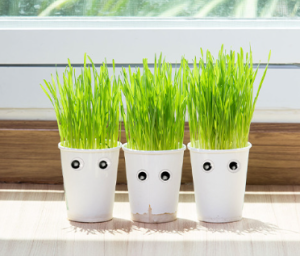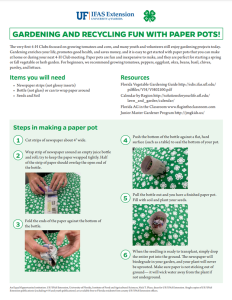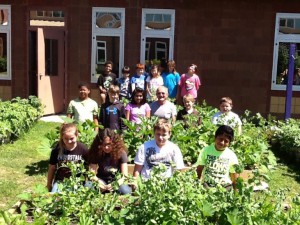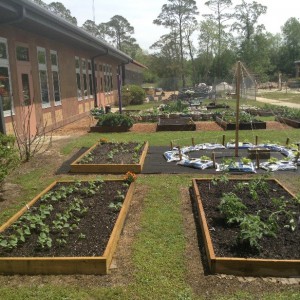5 Easy Ideas to Spark Green Thumbs
 Gardening is not just about growing plants; it’s about nurturing a connection with the earth, fostering a sense of responsibility, and discovering the wonders of nature. For 4-H youth, gardening provides a hands-on learning experience that teaches valuable skills, promotes healthy living, and instills a lifelong appreciation for the environment. After all, 4-H is about helping youth find their spark! In this article, we’ll explore five engaging activities to help 4-H youth develop their green thumbs and cultivate a love for gardening. These activities are perfect for a club meeting, classroom, or even at home with the family!
Gardening is not just about growing plants; it’s about nurturing a connection with the earth, fostering a sense of responsibility, and discovering the wonders of nature. For 4-H youth, gardening provides a hands-on learning experience that teaches valuable skills, promotes healthy living, and instills a lifelong appreciation for the environment. After all, 4-H is about helping youth find their spark! In this article, we’ll explore five engaging activities to help 4-H youth develop their green thumbs and cultivate a love for gardening. These activities are perfect for a club meeting, classroom, or even at home with the family!
- Recycled Plant Pots– Make plant pots out of recycled materials! This is a fun and easy way to make small pots for seed-starting. All you need are some empty water or juice bottles and newspapers. Download the step-by-step directions.
- Paper Towel Gardening– Figuring out how to space seeds when you plant them can be a daunting task. Seed tapes make this easier, but they are expensive. You can make your own while teaching youth about how many plants can fit in a square foot of space. You will need 2-ply paper towels, school glue, a ruler, and seeds. Most full sheets of paper towels are about 1 foot square. You can do the math to determine how many seeds can fit on one paper towel. Once the spacing is determined, gently pull apart the paper towel layers and use a small amount of glue to glue the seeds in place. Place the other layer of paper toweling over the seeds and glue. Once it dries, you can plant the paper towel according to the depth listed on the seed packet. Below are a few common examples:- Bush Beans- 9 seeds per paper towel
– Cucumbers- 2 seeds per paper towel
– Tomatoes- 1 seed per paper towel - Plant a Plant Person– in a paper cup, or a recycled plant pot from #1 above, plant grass seed. The pot can be decorated to look like a face with googly eyes!
 In a few short days, the “plant person” will grow “hair.” The “hair” can be cut with scissors. Step-by-step instructions can be downloaded from Clover by 4-H.
In a few short days, the “plant person” will grow “hair.” The “hair” can be cut with scissors. Step-by-step instructions can be downloaded from Clover by 4-H. - Planting Party– This activity can double as a service project. Choose a sunny spot at your Extension Office to plant a small herb, vegetable, or flower garden. Work with your Extension office to see if some Master Gardeners might help to demonstrate proper planting techniques, including digging holes, loosening roots, and backfilling with soil. Encourage club members to work together in teams to plant their chosen seedlings, taking turns and offering assistance as needed. Discuss the importance of spacing, watering, and mulching to promote healthy plant growth and prevent competition for resources. As they plant their garden, 4-H youth will develop teamwork skills and a sense of ownership and pride in their collective efforts.
- Garden Journaling: Encourage 4-H youth to keep a garden journal to document their gardening journey and reflect on their experiences. Provide each participant with a notebook or journal and encourage them to record observations, drawings, and notes about their garden activities. Prompt them to write about the plants they’re growing, the weather conditions, any pests or diseases they encounter, and their successes and challenges. Encourage them to take photographs of their garden throughout the growing season to track its progress. Set aside time during club meetings to review and discuss journal entries, share tips and insights, and celebrate achievements. By journaling their experiences, 4-H youth will develop communication skills, critical thinking skills, and a deeper appreciation for the interconnectedness of nature.
Opportunities for further engagement:
If planting seeds and growing them at home, youth can exhibit them at the North Florida Fair in several ways:
- Youth can take photos of their plants and enter it into Class 11. Photos can also be entered in County Events. Blue ribbon photos will move on to 4-H University.
- Youth can enter potted plants or dish gardens in Class 1.
- If harvesting vegetables, youth can enter canned goods in Class 6.
- Youth can create a poster to demonstrate what they learned about gardening (parts of a plant, plant varieties, what plants need to grow, etc). Posters can be entered in Class 12 and can also be entered in County Events. Blue ribbon posters will move on to 4-H University.
- Youth interested in learning more about plants can join a Horticulture Judging Team– the contest takes place on 4-H Day at the Fair on November 9th. The state contest is in June, and the winners go onto the national contest.
Gardening offers endless opportunities for 4-H youth to learn, grow, and connect with the natural world. By engaging in hands-on activities such as seed starting, garden planning, planting parties, journaling, and harvest celebrations, 4-H youth will develop valuable skills, cultivate a love for gardening, and make lasting memories with their peers. So, roll up your sleeves, grab your gardening tools, and let the green thumb adventures begin!


